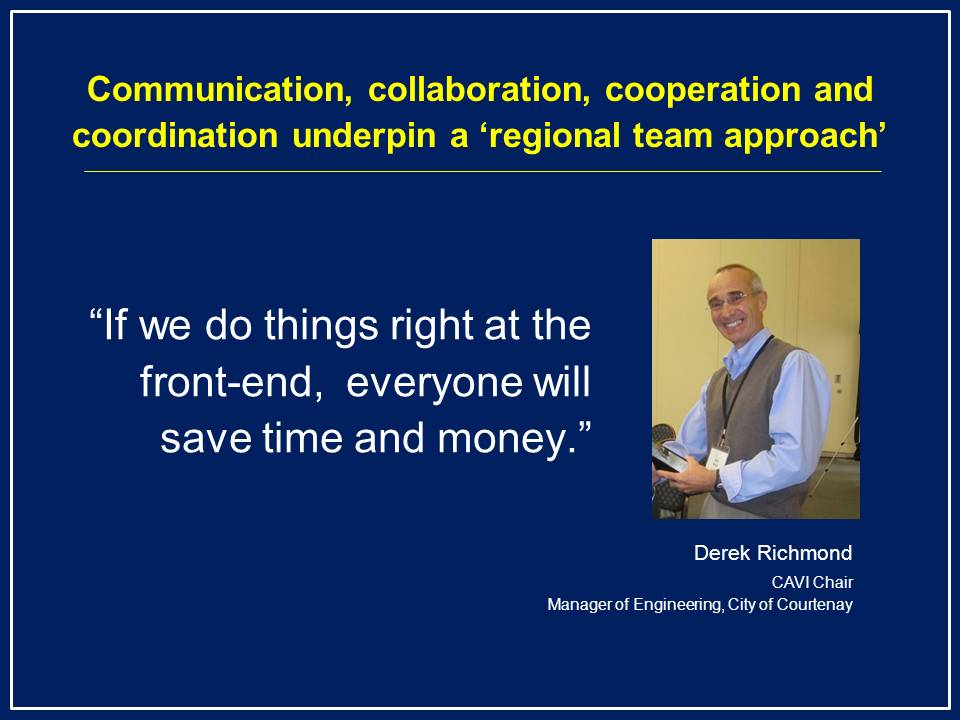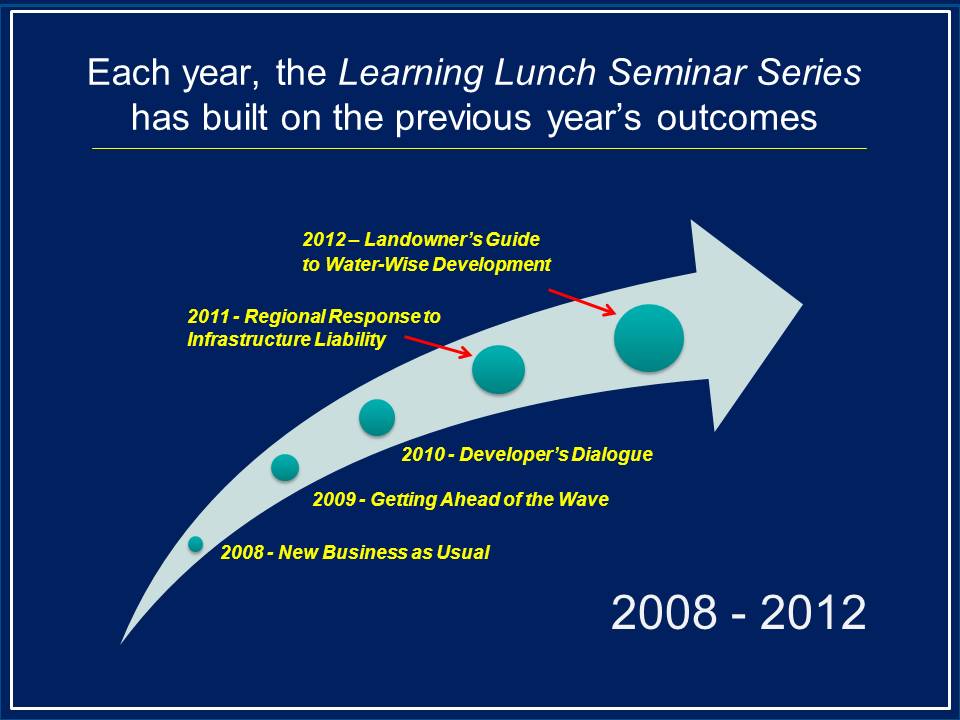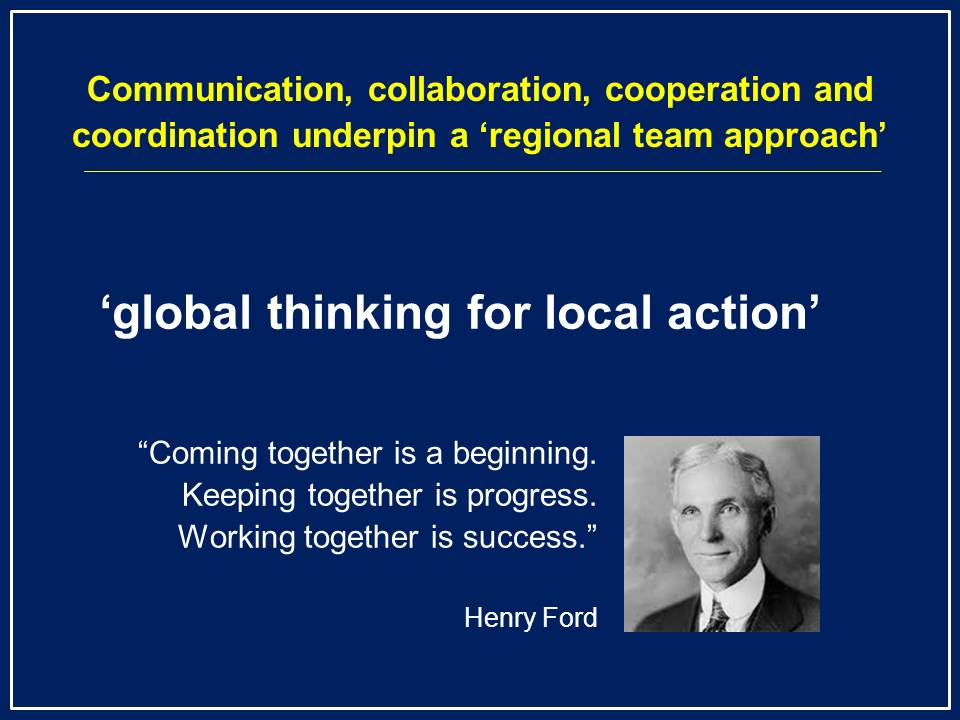CAVI Forum within VIEA Summit – "our mantra is communicate, collaborate, cooperate and coordinate," says Derek Richmond
Note to Reader:
The Hour #1 panel session brought to life defining moments along the ‘CAVI timeline’ for the period 2006 through 2012. The Comox Valley is a provincial demonstration region for “convening for action” and the Partnership for Water Sustainability has invested substantial time and effort in the Comox Valley. In his segment of the Hour #1 panel session, Derek Richmond provided a historical perspective on the Comox Valley experience and the evolution of the “regional team approach”.
Local Governments Convene for Action in the Comox Valley
“The 4Cs — communication, collaboration, cooperation and coordination — has been a mantra in the Comox Valley Learning Lunch Series and amongst the Comox Valley team in general since 2008,” stated Derek Richmond. “The team comprises four local governments, the Comox Valley Land Trust and TimberWest. Doing the right things at the front-end is the intuitive outcome of applying the 4Cs. However, HOW you implement that intuition is key to success.”
Getting it Right at the Front-End Adds Value
“In 2008, the idea of the regional team approach first came together. Then, in 2009, there was a commitment to the regional team concept. In 2010, there was a delay with the hosting process. So, in order to maintain momentum and not let a year go by without there being a ‘convening for action’ event in the Comox Valley, we decided to hold a Developers’ Dialogue to find out what local developers felt was key to them.”
“Two messages came out of this consultation. The first one was the notion of front-end loading and the importance of getting things right at the front-end. The second message was the need for a PROCESS to implement the concept of getting things right at the front-end.”
“WHY, you may wonder?”
“Well, there was a realization on the part of participants in the Developers’ Dialogue that ADDED VALUE would be achieved through being part of a process that did the right things for the right reasons: we would see cost savings, there would be a reduction in the environmental footprint as a result of applying best management practices, and we would achieve a balance between settlement and ecology.”
“HOW, you may ask? The answer to the question lies in an approach that is consistent. The goal posts are not constantly moving. You set the rules at the beginning of the process.”
“In 2011, we had quite a significant shift in the way we were addressing things. We said let’s not look at the usual paradigm when we think about a developer coming to a community and offering to provide infrastructure assets.”
“As a community, you only have an asset if you have the right infrastructure applied at the right time. We said, let’s flip this around. Let’s consider what it means to a community to take on an infrastructure liability because down the road the community cannot afford to renew or replace the infrastructure when it has reached the end of its useful life. And that theme became our focus for the 2011 Series. We recognized that by aligning efforts on a watershed scale, we could develop a regional response to the infrastructure liability issue that is facing local governments across BC and across the country.”
This year, 2012, we built on the Bowker Creek Blueprint experience in the Capital Region. The Comox Valley local governments have developed a Draft Developers Guide that sets the goal posts and presents a process for getting things done right at the front-end.”
Global Thinking for Local Action
“To recap: WHY we are going down this pathway – it is about obtaining added value and a reduction in the environmental footprint. This leads to a balance between economy and ecology. And as for the HOW aspect: if you are going to align efforts on a watershed scale, then getting it right at the front-end means looking beyond your boundaries to envision the bigger picture…..in other words, global thinking for local action. It means you are communicating and cooperating with others to ensure that your collaborative results are coordinated in a timely manner, ” concluded Derek Richmond.
To Learn More:
Complete information can be accessed by clicking on:
20011 Learning Lunch Seminar Series: Regional Response to Infrastructure Liability
2010 Comox Valley Developers Dialogue: Elements of a Successful Project
2009 Learning Lunch Seminar Series: Getting Ahead of the Wave
2008 Learning Lunch Seminar Series: New Business As Usual




